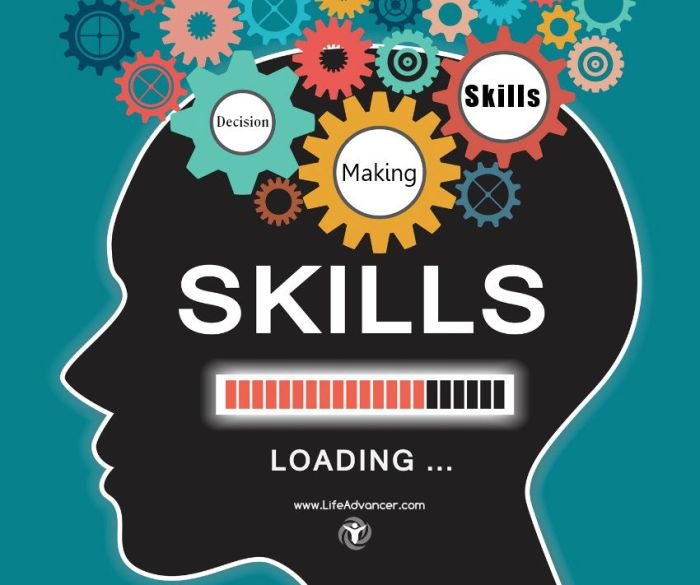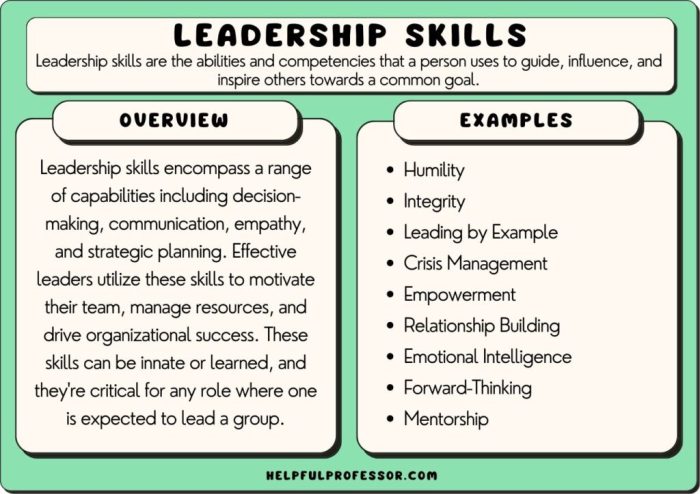Team Management Skills sets the stage for this enthralling narrative, offering readers a glimpse into a story that is rich in detail with American high school hip style and brimming with originality from the outset.
When it comes to navigating the dynamics of leading teams, having a solid grasp of team management skills is key. From effective communication to conflict resolution, these skills play a vital role in achieving success in any professional setting. Are you ready to dive into the world of team management?
Importance of Team Management Skills
Team management skills are essential in a professional setting because they enable leaders to effectively coordinate and guide team members towards achieving common goals. Effective team management can significantly impact productivity by ensuring that tasks are completed efficiently and deadlines are met. Moreover, strong team management skills can boost morale within a team, leading to increased job satisfaction and employee engagement.
Impact on Productivity
Effective team management plays a crucial role in boosting productivity within an organization. When team members feel supported and motivated by their leaders, they are more likely to work together cohesively towards achieving shared objectives. This collaboration can lead to improved efficiency, reduced errors, and ultimately higher output levels.
Contribution to Organizational Goals
Team management skills are instrumental in helping organizations achieve their strategic objectives. By effectively delegating tasks, providing guidance, and fostering a positive team environment, leaders can ensure that all team members are aligned with the organization’s overarching goals. This alignment enables teams to work towards a common purpose, driving progress and success for the entire organization.
Essential Team Management Skills

Effective team management requires a combination of key skills that enable a leader to guide, motivate, and coordinate team members towards common goals. Let’s delve into the essential team management skills that are crucial for success in any team setting.
Communication
Effective communication is the cornerstone of successful team management. Clear and open communication helps in setting expectations, providing feedback, resolving conflicts, and fostering collaboration among team members.
Delegation
Delegation involves assigning tasks and responsibilities to team members based on their strengths and expertise. A good team manager knows how to delegate effectively to ensure tasks are completed efficiently and to empower team members to take ownership of their work.
Conflict Resolution
Conflict is inevitable in any team setting, but how it is managed can make a significant difference. Team managers need to have strong conflict resolution skills to address disagreements, mediate disputes, and find solutions that benefit the entire team.
Decision-Making
Effective decision-making is another crucial skill for team managers. They need to weigh options, consider input from team members, and make informed decisions that align with the team’s goals and objectives.
Empathy and Emotional Intelligence
Empathy and emotional intelligence play a vital role in team management. Understanding and connecting with team members on an emotional level helps build trust, foster positive relationships, and create a supportive team environment.
Adaptability and Flexibility
Managing diverse teams requires adaptability and flexibility from team managers. Being able to adjust to different work styles, cultural backgrounds, and personalities within the team is essential for effective collaboration and productivity.
Developing Team Management Skills

To become a boss at team management, you gotta level up your skills in communication, delegation, and conflict resolution. Let’s break it down, homies!
Enhancing Communication within a Team
When it comes to talking the talk with your squad, it’s all about being clear, open, and respectful. Here are some strategies to boost communication:
- Hold regular team meetings to keep everyone in the loop.
- Use collaborative tools like Slack or Trello to stay connected.
- Encourage active listening and provide constructive feedback.
- Be approachable and create a safe space for team members to share their thoughts.
Effective Delegation and Task Assignment
Don’t try to do it all yourself, playa! Learn to delegate like a pro with these tips:
- Understand your team members’ strengths and weaknesses.
- Assign tasks based on skill sets and interests.
- Set clear expectations and deadlines for each task.
- Follow up regularly to track progress and offer support if needed.
Resolving Conflicts among Team Members
Ain’t no room for drama in a winning team! Here’s how to squash beef and keep the peace:
- Address conflicts early before they escalate.
- Listen to both sides and try to understand their perspectives.
- Find common ground and work towards a solution together.
- Encourage open communication and mutual respect among team members.
Challenges in Team Management
Team managers often face various challenges that can hinder the effectiveness of their teams. These challenges include resistance to change, personality conflicts, and lack of motivation. Overcoming these obstacles is essential for successful team management.
Overcoming Communication Barriers, Team Management Skills
Communication is key to a well-functioning team, but barriers can arise that impede effective communication. To overcome these challenges, team managers can:
- Encourage open and honest communication among team members.
- Provide training on active listening and effective communication techniques.
- Utilize multiple communication channels to ensure all team members are informed.
- Hold regular team meetings to discuss progress, address concerns, and clarify expectations.
Addressing Performance Issues and Maintaining Team Cohesion
Maintaining team cohesion and addressing performance issues are crucial for the overall success of a team. Strategies to address these challenges include:
- Provide regular feedback to team members to help them improve their performance.
- Recognize and reward team members for their contributions and achievements.
- Address conflicts and performance issues promptly and professionally.
- Foster a positive team culture that values collaboration, respect, and accountability.